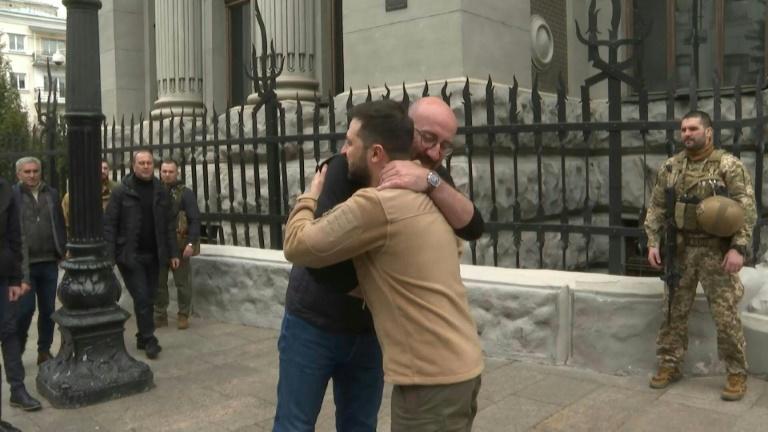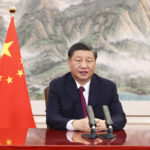
Russian President Vladimir Putin on Thursday claimed the “liberation” of the flattened city of Mariupol after nearly two months of fighting, but signalled he would forgo a final bloody offensive against beleaguered Ukrainian defenders there.
The fate of the besieged port has become totemic as Russia battles to complete a land bridge covering territories of Ukraine already under its control, including Crimea.
The West staged another show of support for President Volodymyr Zelensky with a visit to Kyiv by the Spanish and Danish prime ministers, a day after European Council leader Charles Michel came and vowed the EU would do “everything possible” to help Ukraine win the war.
Zelensky said Ukraine still did not have enough weapons, despite billions in Western military aid that has forced Russia to re-focus its offensive away from Kyiv and towards the east of the country.
In morgues around the capital, the bodies of some 1,020 civilians are being stored after Russian troops withdrew from the region, Deputy Prime Minister Olga Stefanishyna told AFP.
The bodies of nine civilians, some showing signs of torture, have been found in the town of Borodyanka outside Kyiv, the region’s police chief Andriy Niebytov said.
“The Russian military knowingly shot civilians who did not put up any resistance,” he said, adding that one of the victims was a 15-year-old girl.
– Biden ‘proud’ –
While the West remains nervous about igniting a direct conflict with nuclear-armed Russia, US President Joe Biden said he was “amazed” by Ukrainian resistance since the invasion began on February 24.
“They’re tougher and more proud than I thought,” he said, adding that Western “weapons and ammunition are flowing in daily”.
The Pentagon had said Ukraine was receiving fighter planes to bolster its air force — but it later said only aircraft parts had been delivered.
However, the flow of hardware, including anti-tank missiles, has not prevented Russia from carving a trail of destruction across Ukraine, not least in Mariupol on the shores of the Sea of Azov in the southeast.
“Mariupol has been liberated,” Russian Defence Minister Sergei Shoigu told Putin during a televised meeting. “The remaining nationalist formations took refuge in the industrial zone of the Azovstal plant.”
Shoigu said around 2,000 Ukrainian soldiers remained inside the giant steel plant, where the last pocket of Ukrainian resistance has been sheltering in a network of underground tunnels.
Thousands of civilians are believed to have died in the beseiged city, and up to 2,000 others are also sheltering in the plant without access to drinking water or food, according to Ukrainian authorities.
Putin said the “liberation” of Mariupol was a “success” for Russian forces but ordered Shoigu to call off the planned storming of the industrial area, dismissing it as “impractical”.
“There is no need to climb into these catacombs and crawl underground through these industrial facilities. Block off this industrial area so that not even a fly can escape,” Putin said.
– Bodies pile up –
The Ukrainian defenders said they were refusing to surrender but appealed for security guarantees.
“We are pleading so we can collect the bodies of the dead, so the civilians can calmly walk out from Azovstal,” said Captain Sviatoslav Palamar, deputy commander of the far-right Azov Regiment.
A humanitarian corridor reopened on Wednesday, with Ukrainian authorities reporting that four buses had left Mariupol carrying women, children and the elderly.
Further from the frontlines, residents were still reeling weeks after Russian forces withdrew from the area around Kyiv.
At a morgue in Bucha, families carefully searched body bags and examined corpses, looking for missing loved ones.
Four hundred bodies have been discovered there since the Russians withdrew on March 31, local police chief Vitaly Lobas told AFP. Around a quarter of them are still unidentified.
– International snubs –
Meanwhile, Russia’s international isolation has deepened.
At a meeting of G20 finance ministers in Washington, the United States led a walkout of Western allies as Russian officials spoke.
“The world’s democracies will not stand idly by in the face of continued Russian aggression and war crimes,” Canadian Deputy Prime Minister Chrystia Freeland tweeted.
In London, organisers of the Wimbledon tennis tournament banned Russian and Belarusian players from the 2022 event in response to the invasion.
World tennis authorities criticised the announcement, which particularly affects Russian men’s world number two Daniil Medvedev and Belarusian female world number four Aryna Sabalenka.
But the All England Lawn Tennis Club said it was acting to “limit Russia’s global influence through the strongest means possible”.
More than five million Ukrainians have now fled their country since the Russian invasion, the United Nations said, in Europe’s worst refugee crisis since World War II.
But returns have also accelerated in recent weeks, reaching over one million, according to a spokesman for Kyiv’s border force.
Those returning must often take huge risks. Olena Klymenko said Ukrainian soldiers had been demining her pummelled village of Moshchun.
“We found a booby trap in our garden. It seems it was disarmed. We don’t know,” said Klymenko, whose home was destroyed. “Still, we need to look for our stuff.”
– ‘History will not forget’ –
Many have fled into Russia. Ukraine accused the International Committee of the Red Cross (ICRC) of working “in concert” with Moscow to manage the refugees, who it says have been forcibly deported.
Citing data from the UN, ombudswoman Lyudmyla Denisova said that about 550,000 Ukrainians, including 121,000 children, have been taken to Russia during the course of the war.
“Where are they? In filtration camps? In temporary facilities?” Denisova asked. “The International Red Cross is not fulfilling its mandate.”
The ICRC rejected Kyiv’s accusation of collusion with Moscow.
Putin has said he launched his “military operation” to save Russian speakers in eastern Ukraine from a “genocide” carried out by a “neo-Nazi” regime.
But his forces have faced allegations of war crimes — most recently from the EU’s Michel, who toured the devastated town of Borodianka on Wednesday.
“History will not forget the war crimes that have been committed here,” Michel wrote on Twitter.
burs-jit/gil




